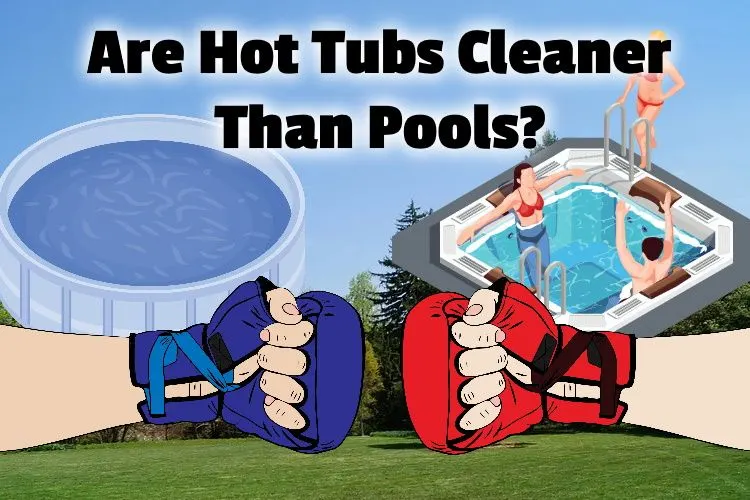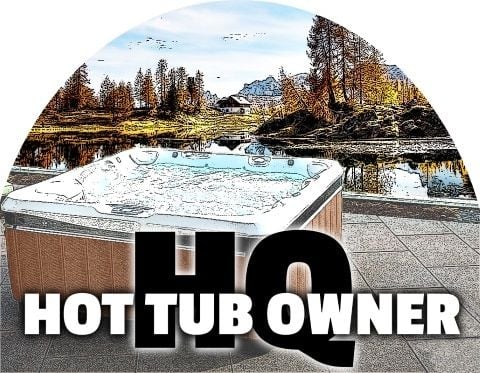I have both a pool and a hot tub, and both have pros and cons. If you are in that fortunate position of having to decide between a hot tub and a pool, you may have wondered, are hot tubs cleaner than pools?
Yes, hot tubs are generally cleaner than pools. However, hot tubs can require a more time-consuming maintenance schedule to keep the water clean, but pools are more prone to problems such as algae which can require a lot of work to eliminate.
This article looks at the differences between hot tubs and swimming pools in terms of maintenance, so if you ever wondered what the difference is, read on.

Are hot tubs dirtier than pools?
Hot tubs can be dirtier than pools due to being smaller and more contained. They also generally get less sunlight which acts as a natural sanitizer.
One big difference between the water in a hot tub and a pool is the temperature. Hot tubs typically operate at 100°F while a pool will be much cooler, between 78° and 82° in most cases.
So why should this affect the cleanliness? Well, bacteria thrive at higher temperatures and moist conditions.
Chemicals behave differently at higher temperatures, and high pH levels can make chlorine less effective as a sanitizer, so it is important to check this weekly.
Changing the water in your hot tub is an integral part of the maintenance schedule to ensure that your tub remains clear and healthy. In a recent article, I looked at this in detail.
And you can read it on my website by clicking on the link.
Swimming pools generally are not covered particularly during periods of use, while hot tubs are always covered, again keeping in the moist air in which germs thrive.
However, being open means that pools get littered with dead leaves, bugs, and other organic material that can lead to problems.
Here’s an important Fall Pool Tip 🍂:
Keeping your pool covered while not in use can save you lots of cleaning time & effort. It also helps prevent water evaporation. Pool covers can extend swimming in Tucson weather! pic.twitter.com/E2zOql9V5C
— Patio Pools & Spas (@patiopools) October 12, 2020
Is a hot tub easy to maintain compared to a pool?
A pool tends to be easier to maintain than a hot tub. A swimming pool needs a chlorine tablet in a floater about once a week, and the occasional balancing or pH and alkalinity. But apart from cleaning the filter, skimming insects off the top, and vacuuming the floor to get rid of leaves, it’s fairly low maintenance.
By comparison, a hot tub can be a lot of work.
Hot tubs need to be emptied, cleaned, and filled every 3 to 4 months, filters cleaned every few weeks along with checks on pH and alkalinity, and chlorine added in the right amount.
The water in a pool will not need changing on any regular basis unless something goes wrong, and even then, it is better to tackle the problem through chemicals than to change the water.
You think it’s bad disposing of 250 gallons of water? Try getting rid of 25,000 gallons
Chemicals play a large part in keeping both clean, but you mustn’t mix pool chemicals with hot tub chemicals. They act entirely differently, even though they may seem the same. This is due to the temperature at which they are designed to work.
Also, pool chemicals are stronger because of the greater volume they have to deal with.
Some people ask, can I use dish soap to clean my hot tub?
I discussed this in a recent article. The bottom line is yes, you can, but you need to clean off the residue thoroughly to avoid foam when you refill.
Just click that link to read it on my site to learn more.
@cardenpark recently spent £10 million building a brand-new spa and making it world class. The spa garden is second to none with glass pods, a fire pit, sauna, hot tubs, vitality pool, alfresco dining and garden bar. #goodspaguide #luxuryspa #spa https://t.co/1CfE2yQAvZ pic.twitter.com/L1upJOfJIi
— Good Spa Guide (@GoodSpaGuide) October 6, 2020
What are the biggest differences between a hot tub and a swimming pool?
The primary difference is one of scale. Hot tubs are much smaller – if they are too big, you lose the jets’ effect. The largest commercial hot tubs – aside from the swim-spa type – seat up to 10 people, while swimming pools can be several times larger.
But pools don’t also don’t have jets, although the filter and pump do act somewhat similarly.
The fact that you have to swim to get from one end to the other dictates the size it needs to be. The other significant difference is one of activity.
In a pool, people like to cool down, swim, play games, whereas, in a hot tub, it is more about relaxation, sitting around and talking.
While swimming pools have jets, they circulate the water and keep it clean rather than generate air bubbles for the therapeutic effect.
You hardly ever change the water in a swimming pool – maybe every 5 or 6 years – while you change the water in a hot tub every 3 or 4 months.
The amount of water per person demonstrates why it is easier to keep pool water clean.
A 250-gallon hot tub will seat five people, but that equates to 50 gallons per person. Those same five people in a 25,000-gallon pool will have 500 gallons each.
So all those body gels, sweat, and dead skin are being concentrated over a much smaller volume in a hot tub.
Backyard pools, hot tubs selling like hotcakes: https://t.co/gjwcqa1vkc pic.twitter.com/8YtJcfyIlg
— CBC New Brunswick (@CBCNB) June 20, 2020
Are hot tubs full of germs?
Provided you follow the simple rules on maintenance, there should be little or no harmful germs in your hot tub. However, being lax on water maintenance can lead to more germs in a hot tub than you would typically find in a swimming pool.
However, if you come home from work looking to relax in your hot tub and you find the water cloudy and smelling of cabbage, or even worse, then you have a problem that needs fixing fast.
In a recent article, I discussed this topic in detail. What really surprised me was how many different issues can cause that problem.
Just click that link to read it on my site.
Adding sanitizer and checking pH and alkalinity levels are an essential part of hot tub maintenance, but it doesn’t end there. You need to clean your filters every 3 weeks or so, with a deep clean every 3 to 4 months.
And if you’re on top of that and your water chemistry, you can probably go 2 years before needing to replace your filter.
You may also get a build-up of biofilm over time too.
This is the residue from body lotions, deodorant, sweat, and other organic matter that finds its way into your tub. Most of this gets caught up in the filter, but some find its way to the pump.
Flushing out biofilm in the pipes will clear this.
When changing your water, add some Ok Yuk Healthy Hot Tub Cleaner (click to see the current price on Amazon) just before you empty the tub and run the jets for an hour. Then drain, rinse, and refill.
This will remove contaminants and improve filtration when you refill.
Amazing houses with hot tubs/pools in the UK: https://t.co/pGqf0kJ0tH pic.twitter.com/kLR61uDWqp
— Chlo (@ChloeWeaver97) October 9, 2020
How can you tell if a swimming pool is dirty?
A dirty pool will be cloudy and/or green in color. A healthy pool will not give off any strong odor. The water will also be clear with just a hint of blue color. But the smell of chlorine is not a sign of a healthy pool; it means that the balance is wrong.
But that’s just a quick snapshot.
A dirty pool may be caused by excessive contaminants from body fluids and other organic material. You may also see bubbles or foam building up on the surface. This is also a sign of contamination from body lotions, sunscreen, perfumes, and cologne.
Water can become cloudy, particularly after heavy rain, and can be caused by poor water circulation but may be due to chemical imbalance. Check the pH and alkalinity levels and clean out the filter regularly to avoid this.
But in my experience, chlorine levels being too low combined with sunlight and maybe a recent rain often collides to create an algae problem in pools.
If the water is green or a yellow-brown, you definitely have an algae problem. Inadequate sanitizer levels allow algae to grow, which will eat up the debris in your pool creating a ‘bloom.’
How did algae get there?
Because a pool is uncovered, it is more prone to environmental changes such as extremes in heat, excessive rainfall, and high winds. Debris can easily get into the pool, bringing with it bacteria and algae spores.
Luckily, it’s not hard to get rid of algae. With my Intex above-ground pool, I keep a quart of this product from Amazon on hand at all times. Algae can crop up in under 24 hours, so if you start to see it, don’t wait!
Swimming in a dirty pool is dangerous, and if you wear contacts, this can cause eye infections and corneal ulcers.
Check out this recent article on my website to learn more. Just click on the link to read it. You may be surprised to find what alternatives there are to contacts when you want a swim or a soak.
Final Thoughts
Hot tubs and pools are only as clean as you make them. Many things can contaminate the water in both, but there is no reason to suffer from cloudy or smelly water with the correct maintenance schedule in place.
They both have different issues. Hot tubs are a very small, warm, and moist environment where bacteria can thrive. Pools are large expanses of water, open to the elements.
Understanding how to deal with each is the key to keeping your pool or tub clean and healthy.
I hope this covers everything, but if you have any questions, just drop me a line or add a comment. And don’t forget to check out the links to other related articles on my site.
As an Amazon Associate, I may earn a small commission from qualifying purchases if you click on Amazon from my site and choose to make a purchase. You can read my complete affiliate disclosure for more details.
- Relxtime 6 Person Square Inflatable Hot Tub (2024 Review) - March 11, 2024
- Hot Tub Cover Mold – Complete Cleaning Guide - February 20, 2024
- Hot Tub Heater Longevity: How Often Should You Replace? - December 14, 2023
